#Doom Loop
Explore tagged Tumblr posts
Text
Insurance companies are making climate risk worse
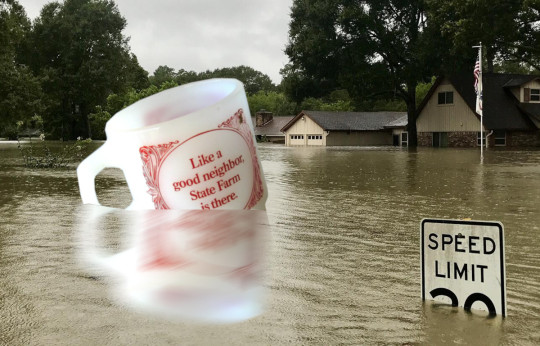
Tomorrow (November 29), I'm at NYC's Strand Books with my novel The Lost Cause, a solarpunk tale of hope and danger that Rebecca Solnit called "completely delightful."

Conservatives may deride the "reality-based community" as a drag on progress and commercial expansion, but even the most noxious pump-and-dump capitalism is supposed to remain tethered to reality by two unbreakable fetters: auditing and insurance:
https://en.wikipedia.org/wiki/Reality-based_community
No matter how much you value profit over ethics or human thriving, you still need honest books – even if you never show those books to the taxman or the marks. Even an outright scammer needs to know what's coming in and what's going out so they don't get caught in a liquidity trap (that is, "broke"), or overleveraged ("broke," again) exposed to market changes (you guessed it: "broke").
Unfortunately for capitalism, auditing is on its deathbed. The market is sewn up by the wildly corrupt and conflicted Big Four accounting firms that are the very definition of too big to fail/too big to jail. They keep cooking books on behalf of management to the detriment of investors. These double-entry fabrications conceal rot in giant, structurally important firms until they implode spectacularly and suddenly, leaving workers, suppliers, customers and investors in a state of utter higgeldy-piggeldy:
https://pluralistic.net/2022/11/29/great-andersens-ghost/#mene-mene-bezzle
In helping corporations defraud institutional investors, auditors are facilitating mass scale millionaire-on-billionaire violence, and while that may seem like the kind of fight where you're happy to see either party lose, there are inevitably a lot of noncombatants in the blast radius. Since the Enron collapse, the entire accounting sector has turned to quicksand, which is a big deal, given that it's what industrial capitalism's foundations are anchored to. There's a reason my last novel was a thriller about forensic accounting and Big Tech:
https://us.macmillan.com/books/9781250865847/red-team-blues
But accounting isn't the only bedrock that's been reduced to slurry here in capitalism's end-times. The insurance sector is meant to be an unshakably rational enterprise, imposing discipline on the rest of the economy. Sure, your company can do something stupid and reckless, but the insurance bill will be stonking, sufficient to consume the expected additional profits.
But the crash of 2008 made it clear that the largest insurance companies in the world were capable of the same wishful thinking, motivated reasoning, and short-termism that they were supposed to prevent in every other business. Without AIG – one of the largest insurers in the world – there would have been no Great Financial Crisis. The company knowingly underwrote hundreds of billions of dollars in junk bonds dressed up as AAA debt, and required a $180b bailout.
Still, many of us have nursed an ember of hope that the insurance sector would spur Big Finance and its pocket governments into taking the climate emergency seriously. When rising seas and wildfires and zoonotic plagues and famines and rolling refugee crises make cities, businesses, and homes uninsurable risks, then insurers will stop writing policies and the doom will become undeniable. Money talks, bullshit walks.
But while insurers have begun to withdraw from the most climate-endangered places (or crank up premiums), the net effect is to decrease climate resilience and increase risk, creating a "climate risk doom loop" that Advait Arun lays out brilliantly for Phenomenal World:
https://www.phenomenalworld.org/analysis/the-doom-loop/
Part of the problem is political: as people move into high-risk areas (flood-prone coastal cities, fire-threatened urban-wildlife interfaces), politicians are pulling out all the stops to keep insurers from disinvesting in these high-risk zones. They're loosening insurance regs, subsidizing policies, and imposing "disaster risk fees" on everyone in the region.
But the insurance companies themselves are simply not responding aggressively enough to the rising risk. Climate risk is correlated, after all: when everyone in a region is at flood risk, then everyone will be making a claim on the insurance company when the waters come. The insurance trick of spreading risk only works if the risks to everyone in that spread aren't correlated.
Perversely, insurance companies are heavily invested in fossil fuel companies, these being reliable money-spinners where an insurer can park and grow your premiums, on the assumption that most of the people in the risk pool won't file claims at the same time. But those same fossil-fuel assets produce the very correlated risk that could bring down the whole system.
The system is in trouble. US claims from "natural disasters" are topping $100b/year – up from $4.6b in 2000. Home insurance premiums are up (21%!), but it's not enough, especially in drowning Florida and Texas (which is also both roasting and freezing):
https://grist.org/economics/as-climate-risks-mount-the-insurance-safety-net-is-collapsing/
Insurers who put premiums up to cover this new risk run into a paradox: the higher premiums get, the more risk-tolerant customers get. When flood insurance is cheap, lots of homeowners will stump up for it and create a big, uncorrelated risk-pool. When premiums skyrocket, the only people who buy flood policies are homeowners who are dead certain their house is gonna get flooded out and soon. Now you have a risk pool consisting solely of highly correlated, high risk homes. The technical term for this in the insurance trade is: "bad."
But it gets worse: people who decide not to buy policies as prices go up may be doing their own "motivated reasoning" and "mispricing their risk." That is, they may decide, "If I can't afford to move, and I can't afford to sell my house because it's in a flood-zone, and I can't afford insurance, I guess that means I'm going to live here and be uninsured and hope for the best."
This is also bad. The amount of uninsured losses from US climate disaster "dwarfs" insured losses:
https://www.reuters.com/business/environment/hurricanes-floods-bring-120-billion-insurance-losses-2022-2023-01-09/
Here's the doom-loop in a nutshell:
As carbon emissions continue to accumulate, more people are put at risk of climate disaster, while the damages from those disasters intensifies. Vulnerability will drive disinvestment, which in turn exacerbates vulnerability.
Also: the browner and poorer you are, the worse you have it: you are impacted "first and worst":
https://www.climaterealityproject.org/frontline-fenceline-communities
As Arun writes, "Tinkering with insurance markets will not solve their real issues—we must patch the gaping holes in the financial system itself." We have to end the loop that sees the poorest places least insured, and the loss of insurance leading to abandonment by people with money and agency, which zeroes out the budget for climate remediation and resiliency where it is most needed.
The insurance sector is part of the finance industry, and it is disinvesting in climate-endagered places and instead doubling down on its bets on fossil fuels. We can't rely on the insurance sector to discipline other industries by generating "price signals" about the true underlying climate risk. And insurance doesn't just invest in fossil fuels – they're also a major buyer of municipal and state bonds, which means they're part of the "bond vigilante" investors whose decisions constrain the ability of cities to raise and spend money for climate remediation.
When American cities, territories and regions can't float bonds, they historically get taken over and handed to an unelected "control board" who represents distant creditors, not citizens. This is especially true when the people who live in those places are Black or brown – think Puerto Rico or Detroit or Flint. These control board administrators make creditors whole by tearing the people apart.
This is the real doom loop: insurers pull out of poor places threatened by climate disasters. They invest in the fossil fuels that worsen those disasters. They join with bond vigilantes to force disinvestment from infrastructure maintenance and resiliency in those places. Then, the next climate disaster creates more uninsured losses. Lather, rinse, repeat.
Finance and insurance are betting heavily on climate risk modeling – not to avert this crisis, but to ensure that their finances remain intact though it. What's more, it won't work. As climate effects get bigger, they get less predictable – and harder to avoid. The point of insurance is spreading risk, not reducing it. We shouldn't and can't rely on insurance creating price-signals to reduce our climate risk.
But the climate doom-loop can be put in reverse – not by market spending, but by public spending. As Arun writes, we need to create "a global investment architecture that is safe for spending":
https://tanjasail.wordpress.com/2023/10/06/a-world-safe-for-spending/
Public investment in emissions reduction and resiliency can offset climate risk, by reducing future global warming and by making places better prepared to endure the weather and other events that are locked in by past emissions. A just transition will "loosen liquidity constraints on investment in communities made vulnerable by the financial system."
Austerity is a bad investment strategy. Failure to maintain and improve infrastructure doesn't just shift costs into the future, it increases those costs far in excess of any rational discount based on the time value of money. Public institutions should discipline markets, not the other way around. Don't give Wall Street a veto over our climate spending. A National Investment Authority could subordinate markets to human thriving:
https://democracyjournal.org/arguments/industrial-policy-requires-public-not-just-private-equity/
Insurance need not be pitted against human survival. Saving the cities and regions whose bonds are held by insurance companies is good for those companies: "Breaking the climate risk doom loop is the best disaster insurance policy money can buy."
I found Arun's work to be especially bracing because of the book I'm touring now, The Lost Cause, a solarpunk novel set in a world in which vast public investment is being made to address the climate emergency that is everywhere and all at once:
https://us.macmillan.com/books/9781250865939/the-lost-cause
There is something profoundly hopeful about the belief that we can do something about these foreseeable disasters – rather than remaining frozen in place until the disaster is upon us and it's too late. As Rebecca Solnit says, inhabiting this place in your imagination is "Completely delightful. Neither utopian nor dystopian, it portrays life in SoCal in a future woven from our successes (Green New Deal!), failures (climate chaos anyway), and unresolved conflicts (old MAGA dudes). I loved it."

If you'd like an essay-formatted version of this post to read or share, here's a link to it on pluralistic.net, my surveillance-free, ad-free, tracker-free blog:
https://pluralistic.net/2023/11/28/re-re-reinsurance/#useless-price-signals
#pluralistic#doom loop#insurance#insuretech#climate#climate risk#climate emergency#the lost cause#market forces#risk management#price signals#control boards#decarbonization#bond vigilantes#climate resilience
267 notes
·
View notes
Text
Anxiety’s central task, as instructed by fear, is to run ahead and touch everything, circle potentialities with the intention of preventing them from happening, on and on and on in a process that never stops, that becomes one with life.
— Ia Genberg, The Details: A Novel (translated by Kira Josefsson) (HarperVia, August 8, 2023)
12 notes
·
View notes
Text
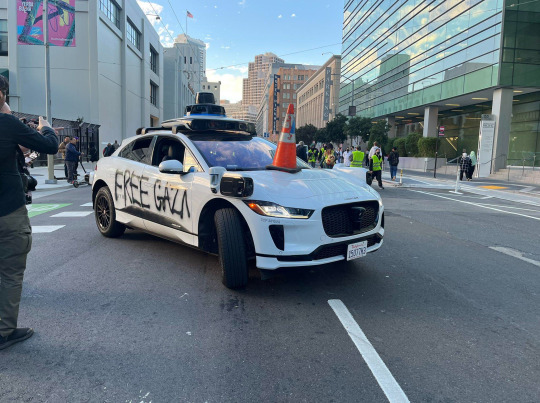
I love San Francisco. So many things converging in one shot.
#San Francisco#free Gaza#Palestine#protest#waymo#APEC#unicorn#self driving vehicles#autonomous vehicles#cruise#civil disobedience#California#doom loop#street art
24 notes
·
View notes
Text

Forgive. Most People Don’t Know What They’re Doing.
I read a couple articles recently. They talked about cities in general and San Francisco specifically. Progressives once heralded the Bay Area as an example of liberal success. But lately, conservatives point to cities like San Francisco and Portland as heralding progressive failure. Some progressive San Franscicans do too, apparently.
Indeed, there’s a lot of seeming evidence pointing towards failure. Both Portland, the liberal bastion where I live, and San Francisco, currently seem overrun by drug addicts, and homeless people overcrowding sidewalks and parks. Graffiti covers nearly every public surface. Commercial offices in Portland are only at 67 percent occupancy. In San Francisco it’s not that much better. Both numbers resulted from the pandemic. Meanwhile, residents of both cities have had enough. Crime is going up. People don’t feel safe.
At the same time, both city governments appear devoid of solutions to these problems.
But are conservatives right? Are these cities really failing? Or is something else important happening?
Bellwether cities attesting to something important
Everything is always working out on planet Earth. So something else must be happening. Despite conservative criticisms, these two cities must be helping in some way. What might that be?
I suggest a radical notion. Perhaps these two cities are helping people see something important. Perhaps people in these cities, those living on the streets and the drug-addicted, are too. The Graffiti could be sending an important message. All these eyesores could suggest that our civilization needs an overhaul.
It’s true. Portland and San Francisco are extreme cases. Los Angeles may be close, but few cities face as much of what these two cities face. Maybe the progressive approach is better at showing how much better we can do to support our fellow humans. So rather than failures, these two cities may be bellwether cities. Cities showing clearly how our approach fails so many individual humans.
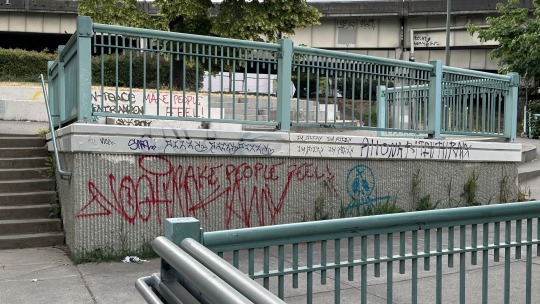
^^In Portland, Graffiti is everywhere.
There but for the grace of…
A person on social media said something important about this. I mentioned dreadful economic conditions which spur someone to turn to drugs:

And the guy replied with a valid point:

Many people face economic hardship. Hardship they keep facing without drugs. Although if we include alcohol, tobacco and weed, we’d have a different picture. In fact, almost half of us are one paycheck away from losing our homes. And many of us cope with LEGAL alternatives: food, sex, streaming and gaming. So many are blessed by the grace of God that they never turn to meth. Or lost their home. But they’re not scot free from the stress of living in today’s reality.
Remember, we’re all God in human form. That fact doesn’t prevent someone making debilitating choices. That’s because we also have free will. Including the freedom to choose bondage, as Abraham says.
They know not what they do
Which brings me back to my conversation. I experienced pretty harrowing economic conditions myself once. I didn’t turn to drugs either. It’s a common refrain. “I didn’t do it. These people don’t need to either.”
But every person’s experience is unique. So comparing them to us is kinda irrelevant. Instead, we could look at “why” they chose what they chose. Then we ask why again. And keep asking until we discover something we haven’t before.
This is certain: were we in the shoes of the graffiti tagger, the person living on the street, that dopesick dude suffering on the sidewalk with his ass hanging out, we would make the same decisions. Not if “we” were in their situation. But if “we” were “THEM“, facing THEIR experiences. Experiences that had them make such choices. We would make the EXACT same choices. Blaming individuals, therefore, is largely irrelevant.
Jesus said of his tormentors “Forgive them Father, for they know not what they do.” Applied to our civilization, we can bring a big dose of forgiveness in every direction. Towards our politicians, our political “enemies”, and towards those seemingly making our cities unsafe.
IT IS NOT THEIR FAULT. The circumstances under which they live evoke that from them as they interpret such situations in the worst possible way. That tendency to negatively interpret is the fault. That’s the learned behavior. Behavior most of us fall into at one time or another. Behavior conservatives fall into when claiming progressive cities as failures.
Portland’s woes may be changing, a recent poll shows. Visitor impressions are improving, yet residents still express reservations. San Francisco’s future remains unclear.
Meanwhile a more permanent change can happen. It must start with individuals, willing to look beyond knee-jerk explanations. People with capacity to forgive rather than judge.
Maybe you’re ready?
#positive thinking#positivevibes#spiritualawakening#positivity#spirituality#positivethinking#spiritual life#spiritualgrowth#happiness#love#Doom loop#conservation#liberal#progressive news#law of assumption#law of attraction
2 notes
·
View notes
Text
2024 Political Assessment - A Year of Manufactured Doom and Gloom Polarized by the Ruling Class
Introduction – How the Assessment was Made Much of my research is inspired by a collective of revolutionaries I meet with several times a month. The League of Revolutionaries for a New America (LRNA) supports every struggle that holds the government accountable. They host political education classes and have several chapters across the country, which have different fronts of struggle committees…
#AI#Alameda County District Attorney Pamela Price#Authoritarian Rule#Bay Area#California Apartment Association#Carroll Fife#Coal#defund police#dispossessed class#Doom Loop#drug addiction#economy#Elon Musk#Garry Tan#homelessness#Lateefah Simons#LRNA#Mental Health#National Politics#Nikki Fortunato Bas#Oakland#Oakland Mayor Sheng Thao#Oakland Police Department#Police Chief LeRonne Armstrong#Police Unions#Politics#Recalls#ruling class#San Francisco#social issues
0 notes
Text
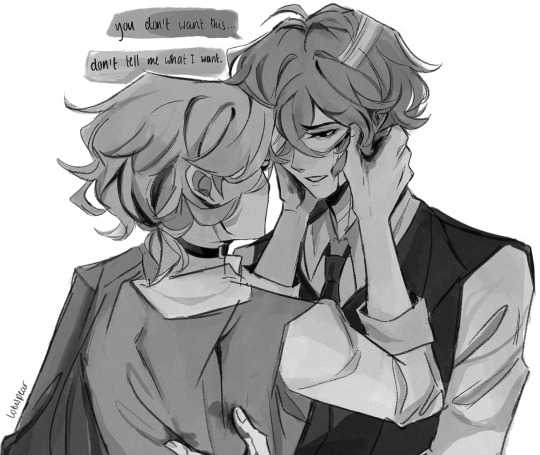

learning to love
#they make me so fucking unwell i feel so ill whenever i think about them#it's OVER for me i'm done#teen skk is going on my fucking suicide note thanks for everything asagiri#something something your bloodied hand in mind something something by you i am forever undone#something something to the world we may be villains but to each other we're two halves of the same soul#head in my fucking hands#sry for getting all emo i rewatched pmmm yesterday and i've been feeling existential about everything#i actually listened to the pmmm ost while drawing it saved me i love you yuki kajiura😍 (i died)#nothing like a haunting latin chorus echoing through my empty head while i draw tragic yaoi 🥰🥰🥰🥰🥰🥰#big shoutout to sis puella magica i had that one on loop for like two hours‼️#anyway enough about the doomed yuri anime back to skk#forget everything i said i actually hope they explode i'm sick of their asses#bungou stray dogs#bungo stray dogs#bsd#chuuya nakahara#nakahara chuuya#osamu dazai#dazai osamu#soukoku#skk#posting at ungodly hours again this is gonna catch up to me 💔#lotus draws
4K notes
·
View notes
Text
I wish we could have met in some other way.
Lawlight Week Day 2: Soulmates
If you saw me repost and re-edit this several times uh No you didn't </3
Still frames/Individual gifs:




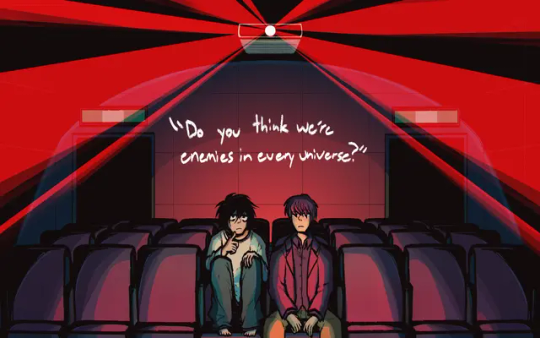
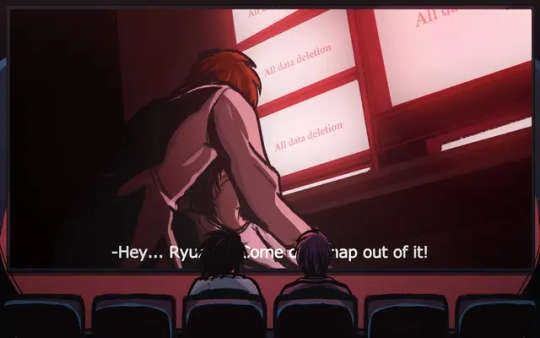
If you know what every frame is from you get a free cookie. by the way
#death note#dn#light yagami#l lawliet#lawlight#oh god here we go#death note jdrama#death note 2015#death note 2006#death note musical#lctw#l change the world#dntm#lawlightweek2024#my art#collapses i am NEVER putting this much effort in one piece ever again /hj this was the Only one i had mostly prepared in advance#ironically the most painstaking part about making this entire thing was converting the images into an animated file#that wasn't either horrifically compressed or just. wouldn't loop. why do gifs have to look so BAD it's so inconvenient#and THEN i realized I had to forcibly Stitch the two animations together so they would actually be synced and it wouldn't look dumb#and the end result is STILL so compressed. because Tumblr. uhhh just don't click on it it'll look so scuffed LOL. anyways#this is what i get for watching Every Adaptation of Death Note. i am a death note multiverse truther#usually i'd have something clever to say in the tags but. this drained the life out of me just uh.#yeah. they're doomed in every universe. this is the only way they could've met. they are doomed by their own natures and the#circumstances that surround them. there is no universe where light tries to prevent L's death. and even in the cases where L Doesn't die#there is no universe where L can save light. there is no universe where he can truly “catch” Kira and make him see where he went wrong#(<- if you read LCTW you know. :) )#in every universe and adaptation L will call Light his first friend. in some universes they'll take that notion more seriously than others#no matter what one of them will die due to the other. its the only constant. it's the only way it can ever be. they are the others downfall
4K notes
·
View notes
Text
Depressions
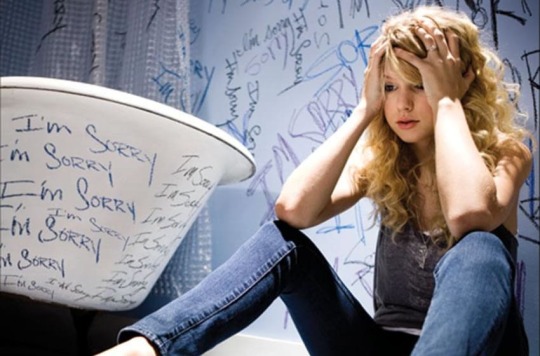
You know what is really shitty? Depressions! I don't know, but maybe some of you already guessed it, I have depressions. I have them since almost 20 years now. And it seems like many people doesn't really know what depressions are or what it feels like to have them, and they don't really understand people with depressions.
The short explanation of it is, that you aren't able to really feel positive feelings. It's like something you know that you should be happy about, like in my case, seeing my rabbits do funny stuff or just running like crazy through our backyard garden, or your favorite sports team winning even though they are the big underdog, or having fun with someone you like or is your friend. You know that you should feel happy about it, but you aren't, because somehow you can't. But you don't know why you can't feel happy about it. The worst thing is when your own family, or often also other people then tell you that you should just enjoy the little things or enjoy something. And you then tell them that you try to, but you can't. But then people doesn't understand you and make you feel like you're thinking wrong. That makes you even unhappier and gets you deeper into the depression. Because depressions also make you feel nagative things even more intense than it seems to be normal. For example, just a simple conversation that isn't going like you wished it would be going, can bring you down. Or just when something isn't quite going as planned.
But depressions aren't the same every day. Sometimes there are days or whole phases where they aren't that bad, then you can have a bit of fun and don't feel completely down and unmotivated to do anything. But there are also days or phases when those depressions are extremely bad and you could cry the entire day and are unable to do anything that you don't really want to do, and even the thing syou want to do are feeling difficult to do, and you don't do them sometimes. And you can't control it, it just happens and most of the times, you don't even know why. You don't know if there was something triggering it or not. But also sometimes you know that you smelled, tasted, felt or saw something that triggered the depression, but in those cases it's often better the next day or so. The worst thing is when your family asks you why you are feeling bad, and you tell them that you don't know, because you really don't know it. And when they then ask again, why you are feeling bad, you have to know it. Because, no matter how often they ask, I rally don't know it, and it doesn't change, it only makes it worse if you ask 10 times, instead it would maybe be better to try to cheer me up with some funny stuff or talking about things that interest me.
The completely worst thing is, that people always tell you that you aren't doing enough for almost anything. But why don't they understand that you are completely on or over your limit and it isn't possible for you to do more? That makes you feel even more like a useless bag of trash.
Another thing about depressions is, that you really (and that's not just a picture, it's really like that) see colors not as bright as they were before you had depressions, everything seems to have a slight grey filter over it. And also you are extremely stressed all the time. In my case it is that bad, that even trying to relax is stressing me. And that high stress level is also meaning that I have less motivation to do anything, because I'm simply not able to do anything too exhausting, especially mentally exhausting. Which makes people call me lazy, which brings you down again and make you feel worse, because you don't want to be lazy, but you just can't do more or better. Also the high stress level is sometimes making me say things that I don't want to say, because they may seem rude, and as soon as I said those things to someone, I feel worse again and could start crying, because I hate myself for saying that. Most of the times, I go away and hide myself in my room then and sometimes cry there. People then think I'm upset, but no I'm not, I'm just disappointed from myself and that I hurt someone and I hate myself for who I am in that moment.
And that's bringing me to the next point. I often really hate myself, I sometimes have the feeling, that the happy little boy that I was many years ago, is still there deep inside me, and that he is who I really am, but some day, someone who looks and sounds like me, but isn't me has captured him and locked him away in a cage. That's how I feel, and I can't free that little happy boy again. Sure I know that there isn't another person, I'm not schizophrenic, but that is how it feels for me, with the boy locked away by another me.
And all of that, plus that you seem completely emotionless and bored to everyone, makes it hard to find any friends, so you also feel really alone. Especially if you have anxiety and feel anxious about strangers (like I have). So I'm always glad if I at least find someone to write with over the internet, usually those people are other Swifties. (Thanks @taylorswift because without you, I wouldn't have found at least those two to three people to write. And sorry for tagging you, I always think I'm stupid to tag you, when I do.) But in the next moment, I feel sad, because I know that we won't ever see us and could really experience something together, like real friends.
And another point why I'm thankful to @taylorswift is that her music is the only thing that at least helps a tiny little bit to feel better, when my depressions are really bad. I also don't know why, but it's really only her music, that's also the reason why I'm her fan. And it's also the reason, why I really like some songs that aren't very popular among Swifties, like Me!, Shake It Off, or Stay, Stay, Stay, because those songs are sounding happy, or cheer me up with their positive sounding upbeat style, or because they are funny in general. Also it is the reason why I don't like the very popular Folklore and Evermore that much, because many songs on those albums are making me even more depressive and sometimes making me feel really bad, so I can't listen to them in bad phases.
Also something bad about depressions is, that you remember all those bad things that happened to you, but almost no good things. And even if you remember good things, they are just neutral for you. But you can't do anything about it. The weird thing is, that in july, when I got the two VIP tickets for the Eras Tour, I had a feeling that I wasn't feeling in almost 20 years, I was happy, so happy that I had tears in my eyes, and I don't know how that could happen, because I thought I'm unable to feel that way since almost 20 years, the bad thing is, that just two minutes later, we noticed that we bought the tickets, accidentially, with the wrong account and they have a name on it, so the feeling was gone forever, because there was another problem to solve. But somehow it showed me, that I still can feel happy, I just have to find out how, and I hope the Eras tour will make me happy. The only problem is, that I doubt that I will be able to go there, because of my other big health problems (the physical ones, that I described in my pinned post). It would break my heart if I won't be able to go there, because it is my dream to see Taylor live, at least one time, and I saved money since 2017 for the VIP tickets.
Another thing about depressions is, that you feel completely useless some days, or even most of the times, like you do everything wrong and can't do anything useful. And if you would ask me, what I am good at, I couldn't tell you anything, except for maybe Simracing, but that's nothing important or useful, so it doesn't count. Sure I like to make photos, but first, I'm just only a bit better than very other person, and second, my camera is 20 years old and a new one is too expensive for me.
So you see, it is a doom loop. I hope I wrote everything I wanted to write. And maybe it helps someone or helps people understand others, who have depressions, better. If you have questions about it, feel free to ask, I try to answer your questions, if they are meant seriously and also not rude.
#taylor swift#taylorswift#taylor swift fan#swifties#swiftie#taylurking#depressions#depression#how depressions feel#bad days#unhappy#not happy#doom loop#feeling useless#no motivation#emotionless#seeing grey#feeling like shit#feeling like trash
1 note
·
View note
Audio
Listen/purchase: She's Cutting My Hair by DREAM NAILS
1 note
·
View note
Text
The story of San Francisco is a tale not of two cities, but a constellation of physical and cultural landscapes that overlap yet feel distinct.
Now more than ever.
The media narrative in recent months has focused so intently on the crises in areas like the Tenderloin and Union Square that outsiders might think all 49 square miles had spun downward into a cesspool of crime-plagued streets and drug bazaars.
But for most of the city, the nooks and crannies and neighborhood scenes, the story is more complex. Even the smallest crossroad has its own identity, shaped by historic and social forces that leave clues in the built terrain around you.
Think of San Francisco, then, as a mosaic of realities that reveal their connections the more closely you look. Here are six vignettes that hint at the facets of this nuanced place — and how even in a city of neighborhoods, the whole can be greater than the sum of the parts.
0 notes
Text
"The Doom Loop "- Walking Through Downtown San Francisco
Downtown San Francisco, we are told, is in a “doom loop”. You probably have heard. Everyday, the San Francisco Chronicle, publishes the latest report on employers leaving downtown, retailers closing their doors, wasted public money on poorly managed programs (2 million dollar toilets!), the latest staggering statistics on homelessness, and so on. And if you didn’t hear it there, the national…
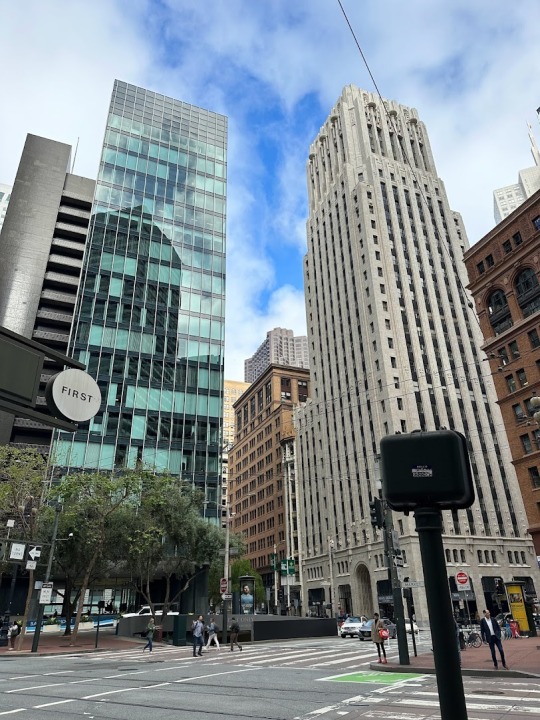
View On WordPress
0 notes
Text
The New Statesman: To tackle the climate “doom loop”, embrace the hope spiral
It’s always useful when someone names a monster, and this week that task fell to the Institute for Public Policy Research and Chatham House think tanks. Their new paper described as a “doom loop” the way climate disasters risk syphoning resources away from efforts to lower emissions and restore nature, and lead, in turn, to yet further warming and loss.
Doom loops are not confined to the external world, the paper argues – they beginwith us. Of particular potency is debate around whether or not the world will breach the Paris Agreement’s advised limit of 1.5°C of global warming compared with pre-industrial levels. Claiming that a breach is already inevitable could encourage fatalism or support for risky and potentially harmful solutions like geo-engineering. On the other hand, failing to sufficiently recognise the extent of the risk of a breach may breed complacency.
The IPPR and Chatham House researchers have some helpful proposals for policymakers. These include more honesty in outlining risks and the scale of response to the climate crisis that is needed. As their emphasis on communication suggests, people’s emotional reactions are just as important as policy actions. Procrastination can lead to feelings of anxiety, guilt and shame. If these are not acknowledged they can turn into anger. Take, for example, the vitriol directed towards Greta Thunbergwhen she dares to call out inaction.
To counter the emotional doom loops, therefore, we should perhaps reach instead for spirals of hope. And while the paper’s authors don’t carry their imagery that far, the doom loop’s counterpoint is almost irresistible. It’s even mirrored in nature: from the pinecone’s helix to the snail shell’s whorl.
Such alternative patterns of response would recognise that new information can reverse the direction of a doom loop. They would accept that the costs of the green transition are significant, but also note that inaction would be costlier because of escalating climate impacts and would miss opportunities for growth. They would acknowledge that, yes, many green technologies rely on harmful mining, but fossil fuel extraction requires much more.
0 notes
Text
Cause when you’re with me I don’t wanna leave
When you’re with me flowers in my teeth
#mansions#doom loop#indie rock#emo#i need a music tag i don't hate#doom loop is definitely my favorite mansions album#or dig up the dead is#but definitely one of those two#Bandcamp
0 notes
Text

I don't know what I was doing When suddenly, we fell apart
[Achromatic Loop AU]
#RRAAAHHHHHH DRAWING SONG LYRICS FOR MY SHIPS GGRRRRR GRRRR GRRRRRRR#they are soooooo doomed by the narrative HAHAHA#tragic yaoi#but as long as they're together it's not so bad#tsp achromatic loop au#tsp au#tsp#tspud#the stanley parable ultra deluxe#the stanley parable#tsp narrator#narrator tsp#stanley tsp#tsp stanley#stanley x narrator#narrator x stanley#stannarrator#stanarrator#stannarator#stanarator#my drawing museum
1K notes
·
View notes
Text
The Manipulation of Elections: How the Ruling Class Weaponizes "Agents of Chaos"
A short series on HBO called Agents of Chaos details how no more than 100 people were able to overthrow the 2016 United States election in favor of President Donald Trump in an intricate Russian troll farm psyop operation. A similar pattern appears to create a “doom loop” narrative in Bay Area elections and across the country using local networks of Tech Billionaires, Real Estate and Landlord…
#Agents of Chaos#Carroll Fife#City of Oakland#democracy#Doom Loop#emily mills#Garry Tan#identity reductionism#Mayor Sheng Thao#Oakland#pizzagate#QAnon#ruling class#San Francisco#Seneca Scott#social media#Tom Wold#Y Imcubator
0 notes
Text

do you finally see me?
#LOTUS ALIEN STAGE ART FINALLY WHO CHEERED ⁉️⁉️⁉️⁉️⁉️⁉️⁉️⁉️#i cried so hard coloring this im never doing cool colors again this hurt me more than round 6#i listened to cure and i want you on like a six hour loop while drawing this i fear i'm not ok#oh also i have no idea what till's supposed to look like bc i couldn't be bothered to pull up a ref so if that doesn't look like him my b#all i know is his hair is gray and that's about it 💀💀💀💀💀#anyway mmm doomed by the narrative unrequited yaoi you KNOW i'm devouring that up#so glad they're reunited in heaven finally ♥️#luka next!! (i want his ass DEAD.)#alien stage#alnst#alnst ivan#alnst till#ivantill#round 6#vivinos#lotus draws
2K notes
·
View notes